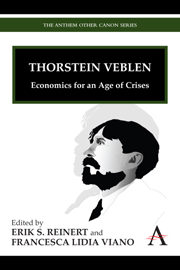Book contents
- Frontmatter
- Contents
- Acknowledgements
- List of Contributors
- 1 Introduction
- 2 Veblen's Contexts: Valdres, Norway and Europe; Filiations of Economics; and Economics for an Age of Crises
- Part One Norwegian Origins and Personal Life
- 3 Explaining Veblen by his Norwegian Background: A Sketch
- 4 Valdres to the Upper Midwest: The Norwegian Background of the Veblen Family and their Migration to the United States
- 5 New Perspectives on Thorstein Veblen, the Norwegian
- 6 The Physical World of Thorstein Veblen: Washington Island and Other Intimate Spaces
- Part Two American Education
- Part Three Veblen's Politics
- Part Four Veblen's Economics
- Name Index
- Subject Index
3 - Explaining Veblen by his Norwegian Background: A Sketch
from Part One - Norwegian Origins and Personal Life
Published online by Cambridge University Press: 05 May 2013
- Frontmatter
- Contents
- Acknowledgements
- List of Contributors
- 1 Introduction
- 2 Veblen's Contexts: Valdres, Norway and Europe; Filiations of Economics; and Economics for an Age of Crises
- Part One Norwegian Origins and Personal Life
- 3 Explaining Veblen by his Norwegian Background: A Sketch
- 4 Valdres to the Upper Midwest: The Norwegian Background of the Veblen Family and their Migration to the United States
- 5 New Perspectives on Thorstein Veblen, the Norwegian
- 6 The Physical World of Thorstein Veblen: Washington Island and Other Intimate Spaces
- Part Two American Education
- Part Three Veblen's Politics
- Part Four Veblen's Economics
- Name Index
- Subject Index
Summary
Explaining Veblen?
Thorstein Veblen is ‘the most creative mind American social thought has produced’. His originality is probably most centrally expressed in his concept and discipline of ‘evolutionary economics’, intended as a substitute for neoclassical economics. The enduring, penetrating force of Veblen's thinking on these matters has been demonstrated from two angles in these past few years. I think, of course, of the shortcomings of neoclassical economics, revealed by the financial crisis of 2008, and of the renewed relevance of evolutionary theory, even of a biological origin, in social science and history.
It would probably lack credibility to imply that a chief – or nearly sufficient – explanation of Veblen's astonishing originality is to be found in his national or ethnic background. After all there is only one Thorstein Veblen to be found in the rather numerous crowd roughly sharing the same background, e.g. his seven siblings. At the level of methodology it has been said recently that ‘Veblen's originality derived from his exploitation of an old historiographical pattern, still submitted to social analysis and practically indistinguishable from it’. Accepting this, it might seem that there is no need to seek an explanation of Veblen outside his quite exceptionally broad erudition in the disciplines of history, biology and political economy, not to mention numerous others, added to a peculiar, personal resourcefulness in combining the very different elements of this erudition.
- Type
- Chapter
- Information
- Thorstein VeblenEconomics for an Age of Crises, pp. 53 - 66Publisher: Anthem PressPrint publication year: 2012
- 2
- Cited by



